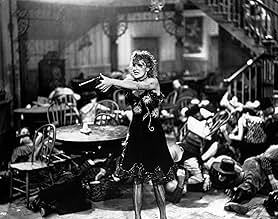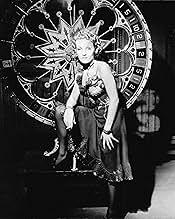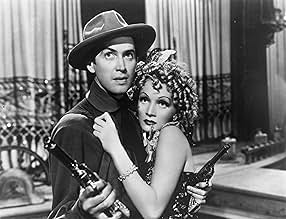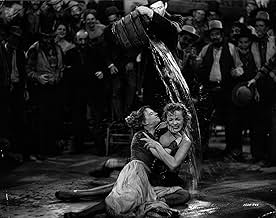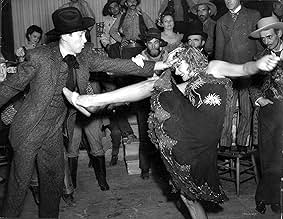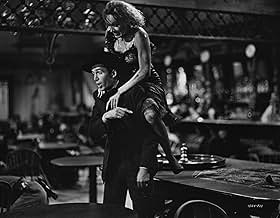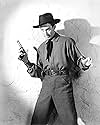Tom Destry Jr., filho de um famoso e já falecido homem da lei, é chamado pelo xerife de Bottleneck para ser o sub-xerife na esperança de que ele colocará ordem na cidade à moda do pai, mas o... Ler tudoTom Destry Jr., filho de um famoso e já falecido homem da lei, é chamado pelo xerife de Bottleneck para ser o sub-xerife na esperança de que ele colocará ordem na cidade à moda do pai, mas o filho tem seus próprios métodos.Tom Destry Jr., filho de um famoso e já falecido homem da lei, é chamado pelo xerife de Bottleneck para ser o sub-xerife na esperança de que ele colocará ordem na cidade à moda do pai, mas o filho tem seus próprios métodos.
- Direção
- Roteiristas
- Artistas
- Prêmios
- 5 vitórias no total
Avaliações em destaque
Destry was equally an important film for Marlene Dietrich. Her career had come to a standstill and she had been let go from her original American studio, Paramount. A whole lot of people said she was through in Hollywood, but Marlene showed them all.
This is the second film adaption of the story, a 1932 version was done by Tom Mix, one of his last films and one of his few sound ones. This one however is THE standard version.
Destry Rides Again was directed by George Marshall who was very good at mixing humor and drama to make some great films. This one is probably Marshall's greatest. Among Hollywood directors from the studio age, he is sadly forgotten.
The town of Bottleneck is one rip roaring place with a whole lot of promiscuous shooting going on. It's a pretty corrupt place run by saloon owner Brian Donlevy and his stooge mayor Samuel S. Hinds. When the sheriff is killed they 'elect' the town drunk Charles Winninger as the new sheriff.
But Winninger who was a deputy sheriff at one time sends for the son of his former boss Thomas Jefferson Destry played by Jimmy Stewart. Destry makes quite an entrance into Bottleneck, running afoul of saloon entertainer Marlene Dietrich. His arrival in Bottleneck up to his first encounter with Marlene are some of the funniest moments ever put on screen.
Destry Rides Again gave Marlene one of her classic ballads, See What the Boys in the Backroom Will Have as well as Little Joe, the Wrangler. Who would ever have thought that the girl from Germany would wind up having one of her most noted film roles as a western saloon entertainer. But Marlene created an indelible character, so much so that Mel Brooks and Madeline Kahn gave her a real heartfelt tribute in Blazing Saddles. I'll bet Marlene enjoyed that one also.
James Stewart did not return to the western genre until Winchester 73 and Broken Arrow eleven years later. But this was one great film to make a debut in that film art form.
You won't indulge in any promiscuous shooting while Destry is on the job.
The film still looks great. The cinematography and editing are crisp, the sets don't look as though they are made on the cheap and the costumes are beautiful to watch, and the music is rousing and compliments the mood wonderfully. The story is not as good as some of the other components but it is a fun, well-paced and relevant one. And there is a fine cast. Marlene Dietrich, cast against type here looks as though she is having a ball and has some of the film's best scenes and lines, and the wonderful James Stewart in his first western lead shows a believable chemistry(like fireworks I'd say!) and gives a very charming performance. Brian Donlevy is deliciously snide and knows how to sneer and scowl, and Mischa Auer, Charles Winninger and Allen Jenkins are marvellous.
Three things especially elevate Destry Rides Again to an even higher level though. One is the rollicking humour, the dialogue in particular is cracking and delivered with a wicked sense of timing by the whole cast. Secondly, Marlene Dietrich performing the simply fabulous See What the Boys in the Back Room Will have, that scene alone is a timeless classic. And finally, and possibly even the best of all, is the cat-fight between Dietrich and Una Merkel, which as far as I'm concerned has never been bettered.
Overall, a classic western-comedy and not to be missed. I think it could have been a tad longer, but with everything else so good I don't mind so much. 9.5/10 Bethany Cox
I'm intrigued by the voting on this movie as I can't imagine any scale on which it wouldn't get top marks. Where exactly does it drop the ball? Cast - inspired; performances - stellar; script - faultless; direction - millimetre perfect; score - find me one better, ("See what the boys in the back room will have" has gone into the language).
Is it because it's not an arthouse movie? Or because of the dangerous idea that restraint, cool and smarts are more effective weapons than playground bully tactics?
As far as I am concerned, if you want to know how to put a movie together, you can start here. 10/10 is the only possible mark for a masterpiece.
This springs from the same source as Ford's 'characters', recognizable frontier independent-minded eccentrics, with a firm footing in American literature; characters often with a roundabout way of making a point, or pointing a moral, as with Destry's habit of prefacing each little cautionary parable with: 'I knew a fellow once who ' A habit that inevitably drew the aggrieved riposte: 'You know too many fellows, Destry '
The other 'characters' in this film have more than a color or two of parodyMischa Auer's improbable Slavonic cowboy, Charles Winninger's town drunk, Brian Donlevy, unprincipled boss, and Samuel S. Hinds' nicely played judge
In retrospect, it's odd how much this movie gains from its rather touching little postscript Stewart, the unconventional lawman, having pacified his cowtown, strolls the streets with a hero-worshiping lad at his heels, and yet also takes a little cloud of sadness along with him
Marshall's film is considered a classic Western which manages to encompass suspense, comedy, romance, tenderness, vivid characterization, horseplay, songs and standard western excitements, without moving for more than a moment from a studio main street set Hollywood expertise at its very best...
Você sabia?
- CuriosidadesAccording to her grandson Peter Riva, who was interviewed for the Icons Radio Hour, Marlene Dietrich's fight scene was unchoreographed. She and Una Merkel agreed to do it impromptu with the only rule being no closed fists. They used feet, pulled hair, and Marlene had bruises for weeks afterwards, but the director got everything in one take.
- Erros de gravaçãoTom Destry (James Stewart) makes the typical movie actor mistake of shooting his pistol at something by jerking the pistol and firing the gun at the target at the same time. In reality, if a shooter did that he would be moving the pistol off line and would miss every time, because the motion of the hand would impart a vector onto the bullet that would make it miss. Also, shooting that way is incredibly inaccurate. A real shooter would level the pistol at the target and then pull the trigger. Audie Murphy, a trained marksman, shot his pistols correctly in the remake Antro da Perdição (1954).
- Citações
Tom Destry Jr.: Oh, I think I'll stick around. Y'know, I had a friend once used to collect postage stamps. He always said the one good thing about a postage stamp: it always sticks to one thing 'til it gets there, y'know? I'm sorta like that too.
- ConexõesFeatured in AFI Life Achievement Award: A Tribute to James Stewart (1980)
- Trilhas sonorasSee What the Boys in the Back Room Will Have
(1939) (uncredited)
Lyrics by Frank Loesser
Music by Friedrich Hollaender
Sung by Marlene Dietrich
Principais escolhas
- How long is Destry Rides Again?Fornecido pela Alexa
Detalhes
Bilheteria
- Faturamento bruto nos EUA e Canadá
- US$ 345.000
- Tempo de duração1 hora 35 minutos
- Cor
- Proporção
- 1.37 : 1


